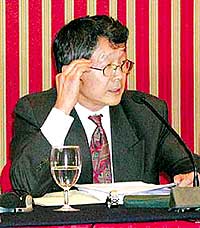 Ken Ohashi, the World Bank's Nepal director, made it clear at the Country Assistance Strategy (CAS) launch last week that irrespective of the government in place, as long as reforms move ahead and the government meets targets it has set, the World Bank will continue to assist Nepal. If the performance is good, was the message, there is more money. While media latched on to the 'failed state' warnings in line with our strong belief in the khattam chha school of thought, the Beed takes a more positive view.
Ken Ohashi, the World Bank's Nepal director, made it clear at the Country Assistance Strategy (CAS) launch last week that irrespective of the government in place, as long as reforms move ahead and the government meets targets it has set, the World Bank will continue to assist Nepal. If the performance is good, was the message, there is more money. While media latched on to the 'failed state' warnings in line with our strong belief in the khattam chha school of thought, the Beed takes a more positive view. World Bank assistance is dependent on scenarios that needs a government to perform and pushes for peace to end the long years of conflict. It is very clear that money will pour in as long as any government ensures that there is a strong anti-corruption drive, true decentralisation, banking and financial sector reforms, well-managed public expenditure and the annual action plan targets that are realised. While the current base scenario looks at an assistance of $120-200 million each year during the assistance period, the best case scenario could be $200-250 million. For sceptics from the Khattam Chha Club, the nightmare is $50 million or less.
It is very important to note the Bank's position on the political situation. While there are accusations that it does not support the multiparty agenda, it has more to do with the functioning of 'patronage politics' rather than democracy itself. The Beed has often questioned whether banking reforms or Nepal's entry into the WTO would have been possible if we were still mired in the old politics.
This does not, however, suggest that we should not get back to parliamentary democracy, but surely when that happens, there will be a strong need for politicians and the government in power to realise that a reform agenda can be pursued. It is always better to achieve reform faster and reap the benefits rather than stagger it and lose out. The Bank's CAS wants to stimulate growth through private sector development, push private public partnerships and create a better environment for investment. It is pinning more hope on the government.
It has to work with the government. But it can also work with independent agencies on specific issues. For instance, in case of economy related legislative reform, it is important to work with advocacy groups and think tanks. Similarly, working directly with successful pro-reform local governments may provide others incentive to move toward reforms.
CAS is what the Bank thinks should be done. Now, the onus is on Nepal to do its bit. At a time when the general feeling is that we are losing out, the Bank's message is that if Nepal can control its own destiny, there is help at hand.



